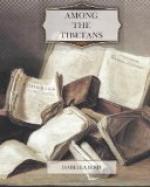Industry in Nubra is the condition of existence, and both sexes work hard enough to give a great zest to the holidays on religious festival days. Whether in the house or journeying the men are never seen without the distaff. They weave also, and make the clothes of the women and children! The people are all cultivators, and make money also by undertaking the transit of the goods of the Yarkand traders over the lofty passes. The men plough with the zho, or hybrid yak, and the women break the clods and share in all other agricultural operations. The soil, destitute of manure, which is dried and hoarded for fuel, rarely produces more than tenfold. The ‘three acres and a cow’ is with them four acres of alluvial soil to a family on an average, with ‘runs’ for yaks and sheep on the mountains. The farms, planted with apricot and other fruit trees, a prolific loose-grained barley, wheat, peas, and lucerne, are oases in the surrounding deserts. The people export apricot oil, dried apricots, sheep’s wool, heavy undyed woollens, a coarse cloth made from yaks’ hair, and pashm, the under fleece of the shawl goat. They complained, and I think with good reason, of the merciless exactions of the Kashmiri officials, but there were no evidences of severe poverty, and not one beggar was seen.
It was not an easy matter to get back to Leh. The rise of the Shayok made it impossible to reach and return by the Digar Pass, and the alternative route over the Kharzong glacier continued for some time impracticable—that is, it was perfectly smooth ice. At length the news came that a fall of snow had roughened its surface. A number of men worked for two days at scaffolding a path, and with great difficulty, and the loss of one yak from a falling rock, a fruitful source of fatalities in Tibet, we reached Khalsar, where with great regret we parted with Tse-ring-don-drub (Life’s purpose fulfilled), the gopa of Sati, whose friendship had been a real pleasure, and to whose courage and promptitude, in Mr. Redslob’s opinion, I owed my rescue from drowning. Two days of very severe marching and long and steep ascents brought us to the wretched hamlet of Kharzong Lar-sa, in a snowstorm, at an altitude higher than the summit of Mont Blanc. The servants were all ill of ‘pass-poison,’ and crept into a cave along with a number of big Tibetan mastiffs, where they enjoyed the comfort of semi-suffocation till the next morning, Mr. R. and I, with some willing Tibetan helpers, pitching our own tents. The wind was strong and keen, and with the mercury down at 15 degrees Fahrenheit it was impossible to do anything but to go to bed in the early afternoon, and stay there till the next day. Mr. Redslob took a severe chill, which produced an alarming attack of pleurisy, from the effects of which he never fully recovered.




